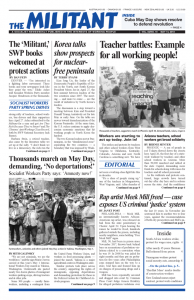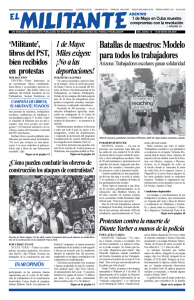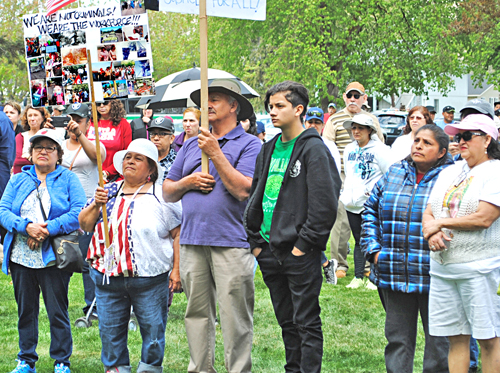“We are not criminals, we are the workforce,” said the sign Maria Cuevas carried at this year’s May 1 International Workers Day march in Yakima, Washington. Underneath she pasted nearly two dozen photos of immigrant workers picking crops, driving tractors and at other jobs.
Some 300 people — mostly farmworkers, including a contingent from the United Farm Workers Union, and workers in food processing plants — joined the march. Yakima is a major agricultural center in Washington state.
Similar protests took place across the country, supporting the rights of immigrants, opposing deportations and demanding protection for those in the Deferred Action for Childhood Arrivals program.
One of the largest actions this year was a march of 3,000 in Waukesha, Wisconsin, a city near Milwaukee. Buses bringing protesters converged there from across the state.
Voces de La Frontera (Border Voices), which organized the action, picked Waukesha because County Sheriff Eric Severson has signed a 287(g) agreement with Immigration and Customs Enforcement. Under this program, local police are trained and authorized to act as immigration cops. The program facilitates the deportation of workers stopped by the cops, including for minor traffic violations.
Voces de la Frontera organized demonstrations of tens of thousands in 2017 against implementation of 287(g) in Milwaukee. Their actions helped lead to the resignation of notorious Milwaukee Sheriff David Clarke and successfully blocked the program there. According to Channel 7 News, only two police departments in the Midwest have implemented the program.
‘We need to be treated as equals’
“I came today to fight for the rights of immigrants,” Oscar Basurto, originally from Mexico City, told the Militant at the Waukesha protest. “We want to live in freedom. We need driver’s licenses to go to work. We need to be treated as equals in the labor force.”
Members of the Socialist Workers Party joined the action, and others across the country, demanding amnesty for all immigrants and an immediate end to deportations, demands that are central to uniting the working class.
About 2,000 people marched in Los Angeles. Some had traveled to San Diego a few days before to welcome a caravan of Central Americans who traveled to the border to ask for asylum because of fear of gangs and violence in their home countries. The White House had pointed at the caravan as a reason to tighten border controls. As of May 2 immigration officials have allowed 74 to enter the U.S. and request asylum.
There were also May Day marches for immigrant rights in Oakland, California; Seattle; Chicago; New York; and other cities.
On the eve of the actions, a third federal court ruled to block the Donald Trump administration from rescinding the DACA program that protects “Dreamers” from deportation and grants them work permits.
President Trump issued an order Sept. 5, 2017, to phase out the program, saying he opposed its creation by executive order by then President Barack Obama. Trump said he wanted Congress to adopt the program.
The president tried to bargain for congressional approval for DACA in exchange for allocating money to extend the wall at the border. He was blocked each time by Democratic legislators.
Immigrants under 16 years old who arrived in the U.S. before Jan. 15, 2007, and graduated from high school or who were still studying, are eligible for relief under DACA. Nearly 700,000 youth have qualified.
U.S. District Judge John Bates gave the administration 90 days to convince him to change his ruling. Otherwise, he said, not only can the program not be ended, but the government will have to start accepting new applicants.
Meanwhile, seven state governments — in Alabama, Arkansas, Louisiana, Nebraska, South Carolina, Texas and West Virginia — sued in federal court to “immediately rescind and cancel all DACA permits,” claiming they are unlawful.
The propertied U.S. ruling families depend on immigrants, especially those without U.S. documentation, as a source of superexploited labor. They seek to use them to push down the wages of all workers, the better to compete against capitalist rivals around the world and boost profits.
With the current uptick in production and hiring, labor is scarcer, and the bosses are not looking to reduce the flow of immigrant labor, but to keep immigrants in a second-class status in hopes they won’t fight for higher wages and better working conditions.
Combating the scapegoating of immigrants is a key battle to unite the working class.
Other workers took advantage of the May 1 International Workers Day to raise their demands. Some 300 nursing home workers, members of 1199SEIU, and their supporters marched in Trenton, New Jersey, demanding the bosses be required to hire more workers and increase staffing levels.


